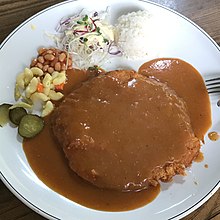This article's lead section may be too short to adequately summarize the key points. (February 2019) |
Dongaseu (Korean: 돈가스, IPA: [to̞nk͈a̠sʰɯ]) is a Koreanized version of Japanese tonkatsu. It consists of a breaded, deep-fried pork cutlet. Typically it is served with sauce glazed over the top, with white rice and a vegetable based banchan side dish.

History
editThe dish was introduced to Korea around 1930s during the period of Japanese rule, but the thick, Japanese-style tonkatsu failed to gain popularity.[1] Don-gaseu became popular in the 1960s, with the spread of gyeong-yangsik—light western food—restaurants.[2] The dish, although called by the Japanese-derived name don-gaseu, followed Western pork cutlet recipes such as those of the Austrian Schnitzel—thinned by pounding before being breaded and deep-fried.[2] It was not sliced, and served with bread. Western-style appetizer soup was served before the dish. Don-gaseu developed into two distinct varieties. In 1977, gyeong-yangsik-style don-gaseu with thin meat became a popular menu in gisa-sikdang—drivers' restaurant, similar to transport café, for taxi drivers—with the addition of chili peppers and kimchi as an accompaniment.[3] As gyeong-yangsik restaurants nearly disappeared, this style of don-gaseu is now commonly served in drivers' restaurants and bunsik-jip (snack restaurants).[2] A second style of don-gaseu, with thicker meat and served sliced following the Japanese method, was made popular in 1983 by a restaurant called Myeongdong Dongaseu.[1] This style of don-gaseu is now commonly served in authentic Japanese restaurants.
Preparation and serving
editKorean don-gaseu is different from Japanese tonkatsu in that it is thinner and often served unsliced, thus eaten with a knife and fork, not chopsticks, and is served with demi-glace on top of the fried meat (or in case of fish cutlet, tartar sauce on the fried fish).[2] Common accompaniments include shredded cabbage sprinkled with ketchup-mayonnaise mixture, baked beans, macaroni salad, sweet corn, and danmuji (yellow pickled radish). Green chili peppers and doenjang (soybean paste) or ssamjang (wrap sauce) for dipping the chili peppers, baechu-kimchi (cabbage kimchi) or kkakdugi (radish kimchi), and rice with Korean or Japanese style soup can be served with the don-gaseu plate.[3] Alternatively, bread can replace rice, in which case Western-style soup is served before the main plate as an appetizer.[2]
Variations
edit- Saengseon-gaseu (생선가스), a fish cutlet similar to don-gaseu, is served with tartar sauce, instead of demi-glace.
See also
edit- List of pork dishes
- Tonkatsu, a similar Japanese dish
References
edit- ^ a b 박, 미향 (21 September 2016). "장사꾼의 끈기, '돈가스의 역사'를 쓰다". The Hankyoreh (in Korean). Retrieved 21 June 2017.
- ^ a b c d e 김, 철현 (3 October 2016). "한국식 돈까스는 왜 고추와 함께 먹을까?". The Asia Economy Daily (in Korean). Retrieved 21 June 2017.
- ^ a b 박, 정배 (5 October 2015). "서양, 일본을 거친 오묘한 변주곡". Weekly Dong-A (in Korean). No. 1007. p. 76. Retrieved 21 June 2017.